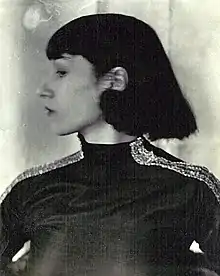Vera Skoronel | |
|---|---|
 (by anonymous) in costume, early 1920s | |
| Born | Vera Laemmel 28 May 1906 Zürich, Switzerland |
| Died | 24 March 1932 (aged 25) Berlin, Germany |
| Nationality | German |
| Occupation(s) | Dancer, dance educator, choreographer |
| Years active | 1924-1932 |
| Parent |
|
| Relatives | Pavel Axelrod (grandfather) Isaac Kaminer (great-grandfather) |
Vera Skoronel (28 May 1906 – 24 March 1932), born Vera Laemmel, was a Swiss-born German dancer and choreographer.
Early life
Vera Laemmel was born in Zürich, the daughter of Vienna-born scientist Rudolf Lämmel (1879–1962) and Sofia (Sonja) Axelrod (1881–1917).[1] Her maternal grandfather was Russian revolutionary Pavel Axelrod, and her great-grandfather was writer Isaac Kaminer.[2]
Skoronel (a name she chose for herself) trained as a dancer in Zürich with Suzanne Perrottet and Katja Wulff, and in Dresden with Mary Wigman.[3] At Wigman's school her fellow students included Gret Palucca, Hanya Holm, and Leni Riefenstahl.[4][5]
Career
In 1924, Skoronel became dance director for theatres in Oberhausen, Hamborn and Gladbeck. In the 1925-1926 season she was dance director at the theatre in Darmstadt. In 1926 she opened a school in Berlin with fellow modern dancer Berthe Trümpy (1895-1983).[2][6] She was a proponent of the modern style known as "abstract dance", or Ausdruckstanz.[7] Her students included dancer Ludwig Lefebre,[8] music educator Hanna Berger, diver Ilse Meudtner, and Polish artist Oda Schottmüller. She also taught members of the Sara Mildred Strauss Dancers, from New York.[9] In 1930 she and her students attende the third German Dance Congress, in Munich.[10] "Perhaps no dancer of the Weimar era was as aggressive in the pursuit of an emphatically modernist group aesthetic as Vera Skoronel," according to dance historian Karl Eric Toepfer.[11] Illustrator G. R. Halkett described her as having "one face which could not be overlooked."[12]
Personal life
Skoronel died in 1932, aged 25, in Berlin, from a blood disease, possibly complicated by alcohol abuse.[2][13] Her grave is in the Wilmersdorf quarter of Berlin, and there is a small collection of her papers archived at Deutsches Tanzarchiv Köln in Cologne.
References
- ↑ Connelly, John (2012-03-19). From Enemy to Brother: The Revolution in Catholic Teaching on the Jews, 1933 to 1965. Harvard University Press. p. 57. ISBN 978-0-674-06488-1.
- 1 2 3 "Skoronel, Vera". Deutsche Biographie (in German). Retrieved 2020-04-05.
- ↑ Heinrich, Anselm C. (July 2007), Review of Manning, Susan, Ecstasy and the Demon: The Dances of Mary Wigman, H-German, H-Review, retrieved 2020-04-05
- ↑ Wieland, Karin (2015-10-05). Dietrich & Riefenstahl: Hollywood, Berlin, and a Century in Two Lives. W. W. Norton & Company. ISBN 978-1-63149-096-5.
- ↑ Funkenstein, Susan. "Picturing Palucca at the Bauhaus" in Susan Manning and Lucia Ruprecht, New German Dance Studies (University of Illinois Press 2012): 45. ISBN 9780252036767
- ↑ Skoronel, Vera; Trümpy, Berthe (2005). Schriften und Dokumente (in German). F. Noetzel. ISBN 978-3-7959-0853-9.
- ↑ Daly, Ann. "Individuality and Expression: The Aesthetics of the New German Dance, 1908-1936." TDR [Cambridge, Mass.], vol. 41, no. 4, 1997, p. 176. Gale Literature Resource Center, Accessed 5 April 2020.
- ↑ "College Engages Noted Dancer". The Cincinnati Enquirer. 1936-11-29. p. 5. Retrieved 2020-04-05 – via Newspapers.com.
- ↑ "European Papers Carry Notes of Students, of Interest Locally". The Montgomery Advertiser. 1929-08-11. p. 18. Retrieved 2020-04-05 – via Newspapers.com.
- ↑ Martin, John (13 July 1930). "The Dance: Munich's Festival". The New York Times. p. 102 – via ProQuest.
- ↑ Toepfer, Karl Eric (1997). Empire of Ecstasy: Nudity and Movement in German Body Culture, 1910-1935. University of California Press. pp. 241–245, quote on page 241. ISBN 978-0-520-91827-6.
- ↑ G. R. Halkett (1939). The Dear Monster. Jonathan Cape. pp. 228–229 – via Internet Archive.
- ↑ Wigman, Mary (2003). Liebe Hanya: Mary Wigman's Letters to Hanya Holm. Univ of Wisconsin Press. pp. 41. ISBN 978-0-299-19074-3.
External links
- A portrait of Vera Skoronel, published in 1932, at Getty Images.
- A portrait of Vera Skoronel, by photographer Steffi Brandl, from about 1928, at Getty Images.